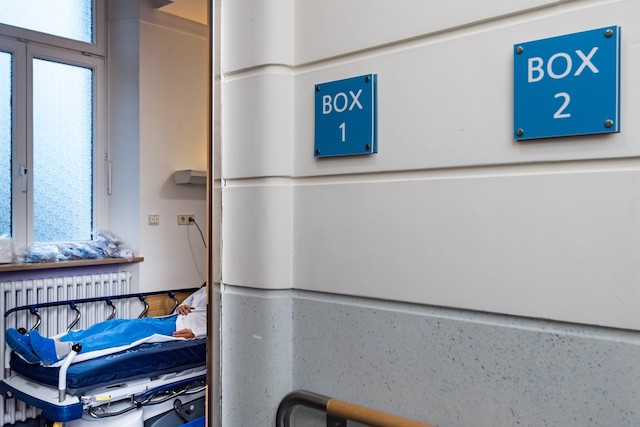3,247 doctors practiced in Luxembourg in 2017, according to the 2020 Social Security report, which is 3.8%more than in 2008--a figure that’s growing faster than that of the protected population, which grew by 2.9% over the same period. Reassuring, but not sufficient, according to professionals.
21.6% of doctors over 60
Based on the Inspectorate General of Social Security (IGSS) report published in September 2020, it’s clear that with three doctors per 1,000 inhabitants, Luxembourg has a relative number slightly lower than its neighbors (3.1 for Belgium, 3.2 for France and 4.3 for Germany).
Above all, the 2,088 doctors considered to be active practitioners (having invoiced at least medical fees to the tune of €18,000 per year) are aging. The share of those aged over 60 has increased from 10.8% to 21.6% in nine years. And their replacements are concerned. In its December 2020 study, the Luxembourg Association of Medical Students (Alem) reported a 30% loss of young talent in the Grand Duchy, due to insufficient training available.
To remedy this, the government announced several measures in its national health plan, such as the possibility of practicing medicine and the health professions in societal forms. One way "to increase the attractiveness and flexibility" of the health professions.
Medicine in societal form: not a panacea
"It's a good thing," confirms Dr Jean-Marc Weber, who has been a general practitioner and sports doctor set up in Luxembourg City for just shy of 10 years. His practice does not have the space to welcome new professionals and isn’t planning to move at this time, but if it did or if he had only just moved in, "I could very well imagine working in this way.”
On the one hand, it would make it possible to associate with other professions such as "psychologists, physiotherapists, nurses ... in relation to patient service, that is something of interest". And to work as an employee, with hours and a fixed salary. The doctor thinks this could attract new professionals to the grand duchy. He says he feels the shortage of specialists when he sends his patients there, who often have to wait several months just for an appointment.
Alain Schmit, president of the Association of Doctors and Dentists (AMMD), admits that this will offer organisational advantages to general practitioners. He said he was more divided on the attractiveness for specialists. For him, the problem stems from the fact that the latter are dependent on hospital infrastructures for all that is ambulatory--for example, imaging, endoscopy, outpatient surgery... whereas there could be benefits to developing outside. Compare, for example, going for a scan in hospital to "going to the Belle Étoile just to buy a baguette".
The shortage of doctors remains a "European problem", he explains. And since we are "looking for doctors everywhere", it is difficult to play on higher salaries in Luxembourg to attract, especially when the rents are also higher than those in neighboring countries.
The social security report also shows that 26.4% of physicians practicing in Luxembourg do not live in the country, compared to 15.6% in 2008. In 2017, only 51.4% of active practicing physicians had Luxembourg nationality, compared to 64.8% in 2008.
While there is still a significant proportion of French, Belgians and Germans, "the foreigners we have had in recent years have come from farther afield,” explains Schmit, citing Greece and Italy, Portugal, Romania. Some regions, such as the north of the country, suffer even more from the lack of doctors, even if "we cannot compare to certain medical deserts in France, for example."
Improve training
The issue of medical demographics is also a concern at the hospital.
"This is a subject very close to my heart," says Romain Schockmel, medical director of the Emile Mayrisch Hospital Center (Chem). According to the social security report, the number of practicing hospital physicians rose from 1,082 in 2016 to 1,298 in 2020. But Schockmel fears above all the shortage to come "in the next five years", when a significant proportion of doctors will enter retirement.
He already feels a lack in specialties which "require a very long training", such as cardiovascular surgery, or those "linked to an on-call activity". General surgery is also the only one, with general medicine, to see the number of active doctors decrease (-1) between 2008 and 2017. Pediatrics, anesthesiology and gynecology-obstetrics are the three specialties most represented.
The medical director relies heavily on the master's in medicine project, on which Gilbert Massard, director of medical education at the University of Luxembourg, is working. It should allow students to "follow comprehensive medical training in Luxembourg" and therefore avoid the brain drain feared by Alem.
Even if it would be necessary to continue "cooperation" with neighbouring countries to cover all specialisations, which seems "difficult to conceive" in Luxembourg. Now, you can specialise in oncology and neurology. Schockmel expects demand to peak once this new degree is in place. It was announced for 2023. Regarding the development of the outpatient clinic outside hospitals, "The problem will be to guarantee the same quality and the same safety.”
This article was originally published in French on Paperjam.lu and has been translated and edited for Delano.
